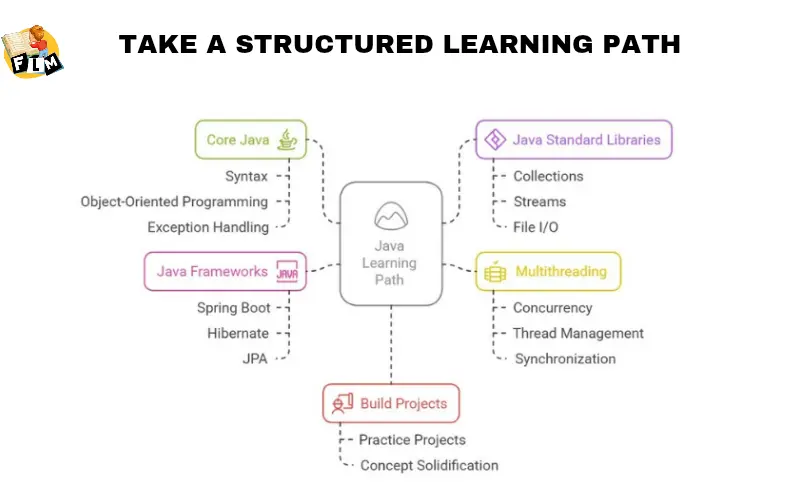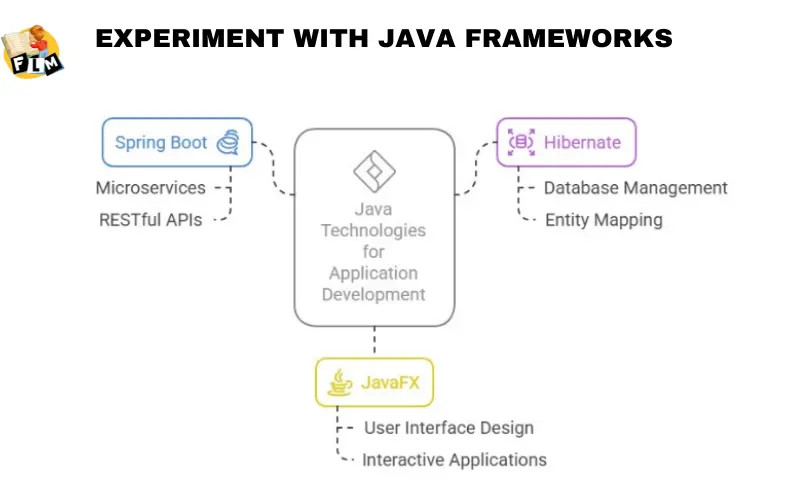It requires dedication, structured learning, and practice to become proficient in Java If you are an amateur developer or a professional developer, having effective learning strategies for Java can help you grasp advanced concepts efficiently and build strong programming skills Java is applied extensively in web applications enterprise level applications mobile applications and even in emerging technologies like AI and cloud computing In order to thrive in this field, you need to have a systematic learning of Java and problem solving.
Strong Core Java foundation
It is of utmost importance to gain a firm hold over the fundamentals of Java prior to advancing to advanced level content. Knowledge of the basic concepts of Java will make programming easy and allow you to study more advanced topics. This is what you should study
- Basic Syntax and Data Types: Know how Java treats variables, loops, conditionals, and operators
- Object-Oriented Programming (OOP): Master the four pillars of OOP encapsulation, inheritance, polymorphism, and abstraction.
- Exception Handling: Master try catch blocks, custom exceptions, and error handling to create fault-tolerant applications
- Collections Framework: Master Lists, Sets, and Maps to work with data structures in Java efficiently
Understanding these basics well will ensure your Learning Strategies for Java to be efficient and ready you for actual development
Practice Programming Regularly
The best way to learn Java is by practice. Instead of reading tutorials, practice every day
- Practice small problems each day to strengthen concepts
- Do coding practice on sites like LeetCode, HackerRank, and CodeChef
- Write your own Java programs from scratch to reinforce your own understanding.
Active coding increases memory and is an essential part of Learning Strategies for Java. The more you write, the more comfortable you will get with the syntax of Java, debugging, and problem solving
Take a Structured Learning Path

Step-by-step learning facilitates effective learning. Adhere to this format:
- Begin with Core Java: Learn syntax, OOP basics, and exception handling
- Learn Java Standard Libraries: Get familiar with collections, streams, and file I/O
- Learn Multithreading: Study concurrency, thread management, and synchronization
- Learn Java Frameworks: Practice using Spring Boot, Hibernate, and JPA
- Build Projects: Practice projects to solidify the concepts
Formal learning motivates you and is one of the best ways to learn Java.
Work on Real-World Projects
Practical training is the only way to become a master of Java. Some of the project ideas are:
- To-Do List Application: Add file handling and UI development.
- E-Commerce Backend: Add Spring Boot and Hibernate
- Chat Application: Add networking fundamentals and multithreading
- Library Management System: Add JDBC and database integration
Project work enhances problem-solving skill and proper application of Java concepts
Learn Data Structures and Algorithms
Data structures and algorithms are the backbone of Java programming Important topics are
- Arrays and Strings
- Linked Lists, Stacks, and Queues
- Trees and Graphs
- Sorting and Searching Algorithms
- Dynamic Programming
Mastery of these fundamentals anchors your programming skills and adapts to optimal learning practices in Java
Join Java Developer Communities
Working with other developers can accelerate your learning and provide you with useful advice. Join
- Java forums like StackOverflow and JavaRanch
- LinkedIn groups and online Java communities
- Local or online Java meetups, conferences, and hackathons
Being a member of an active Java community provides you with mentorship and keeps you updated about industry trends
Join Coding Competitions
Competitive coding enhances problem solving skills. Join
- LeetCode and Codeforces competitions
- Hackathons and coding competitions
- Open-source projects on GitHub
These activities sharpen your Java skills and familiarize you with industry
Be Consistent and Keep Practicing
The secret to success with Java is a determination Program every day, review ideas frequently and keeping up with the current trends in Java. Applying the appropriate study techniques for Java will make you a professional coder and push your career as a programmer to the next level
Read Java Documentation and Books
Official manuals and books are an excellent source to give you detailed information regarding Java concepts. It is recommended to read some of the best books for Java students
- Effective Java by Joshua Bloch – A must-read to learn the best practices
- Java: The Complete Reference by Herbert Schildt – Excellent book that covers the fundamentals and advanced Java
- Head First Java by Kathy Sierra and Bert Bates – Suitable for the beginners with a fun and interactive method
Grazing over Java documentation in the official website of Oracle is also helpful for being aware of the new feature and changes
Utilize Debugging Tools and IDE Features
Integrated Development Environment (IDE) such as IntelliJ IDEA, Eclipse, and NetBeans provide full-fledged debugging tools that benefit in
- Finding and correcting your Java code mistakes
- Adding breakpoints and examining variables
- Implementing step-by-step for your application
Debugging is a valuable skill to learn irrespective of being a Java programmer
Experiment with Java Frameworks

To become a professional Java developer, it’s essential to learn popular frameworks
- Spring Boot: Used in developing scalable enterprise applications
- Hibernate: To implement object-relational mapping and database management
- JavaFX: Used in developing rich client applications
Learning these paradigms will assist in coding maintainable and efficient Java applications
Develop a Portfolio and Contribute to Open Source
A good portfolio demonstrates your skills to potential employers. You can:
- Share work on GitHub
- Blog about technical Java concepts.
- Contribute to open-source projects in Java
Practical knowledge is appreciated by employers, and a portfolio separates you from others
Take Java Certification Courses
Certifications can improve your career even more by ensuring your expertise in Java. Some of the recommended certifications are
- Oracle Certified Java Programmer (OCJP)
- Spring Professional Certification
- AWS Certified Developer – Java
These certifications improve your employment opportunities and raise your profile as a Java developer
Conclusion
Learning Strategies for Java involve practical coding, systematic learning, actual projects, and regular practice. Using these techniques, you can develop a robust Java foundation and shine in your programming career.
Suggested Articles
- How to Contribute to Open Source Java Projects
- Understanding Agile Methodology in Software Development
- Must-Follow Tech Blogs for Java Developers
Future-Proof Your Career with FLM’s AI-Powered Java Full Stack Development
Java Full Stack Developer Training
Learn Java, Spring Boot, React.js, SQL, and AI automation to build powerful web applications. AI is transforming software development, and companies need skilled Java full stack developers who can integrate AI-driven solutions. This 5+ month live, interactive training will help you master real-world projects, automation tools, and industry best practices.
What You’ll Gain?
- High Demand – AI Skills Give You a Competitive Edge
- Earn ₹12 LPA+ with Java Full Stack & AI Expertise
- 100% Live, Expert-Led Training
- AI-Powered Development – Automate Coding & Debugging
- 7 Major & 7 Mini Real-World Projects for Hands-On Experience
- Mock Interviews, Resume Building & Career Guidance
- Exclusive: 2-Year Recording Access for the First 100 Enrollees
- Job-Ready Curriculum with Real-World Applications
Unlock your future with FLM’s AI-Powered Java Full Stack Development — limited seats remaining! Enroll Now
Visit: frontlinesedutech.com | Click Here to Enroll
WhatsApp: 8333077727

